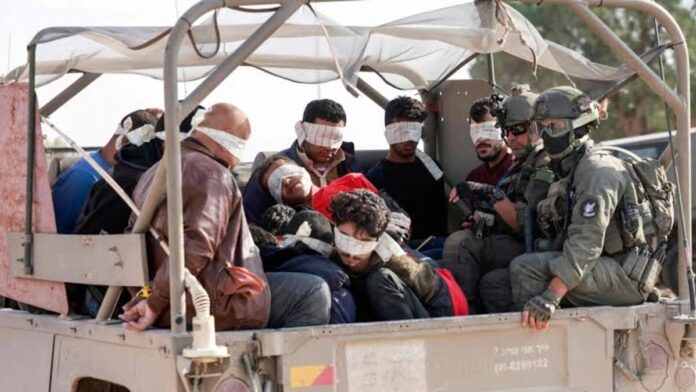The Palestinian organisation, Hamas, and Israel stated on Wednesday that they had reached an agreement on a four-day ceasefire, during which the hostages abducted on October 7 will be released.
Following an almost all-night meeting, Israeli Prime Minister Benjamin Netanyahu’s cabinet endorsed the pact. He informed the sceptical ministers that this was a “difficult decision but it’s a right decision.”
According to an agreement, a four-day “lull” in military operations would result in the release of at least 50 Israeli and international hostages, including women and children, a government spokesperson told AFP.
There would be an additional day of truce for every ten more hostages freed.
In a statement, Hamas expressed support for the “humanitarian truce” and announced the release of 150 Palestinian prisoners from Israeli detention facilities.
After almost seven weeks of full-scale warfare, the truce gives Gazans hope for a much-needed, if brief, respite.
A complete ceasefire on the ground and a suspension of Israeli air operations over southern Gaza were among the provisions of the truce that sources from Islamic Jihad, another Palestinian organisation, and Hamas had earlier informed AFP.
One of the final obstacles preventing the deal from taking effect was the consent of the Israeli cabinet.
The discussions had been mediated in part by Qatar.
Netanyahu was confronted with a rebellion ahead of the vote from members of his right-wing coalition who felt that the agreement would provide too much power to Hamas operatives who carried out the bloodiest attack in Israel’s history.
Firm-line Itamar Ben-Gvir, the minister of national security, declared he would vote against the agreement, arguing that Israeli troops should be released as part of it.
On October 7, 240 hostages—240 civilians and military—who were reportedly being kept in Gaza were taken prisoner by Hamas during raids that resulted in an estimated 1,200 deaths.
Operation “Swords of Iron”—Israel’s punitive air and military campaign against Hamas-run Gaza—was prompted by the brutal attacks. According to Palestinian authorities, it has killed 14,100 Palestinians, the majority of them women and children.
However, the government disregarded any concerns because the hostages’ fate was weighing heavily on the minds of the Israeli public and hundreds of families in Israel and abroad who were desperate to have their loved ones returned home.
Before the crucial meeting, Israel’s influential Defence Minister Yoav Gallant stated that he had obtained guarantees that the agreement would not mean the end of the fight to destroy Hamas.
His statement stated that security activities will “continue in full force” as soon as they had completed this phase.
Netanyahu’s office emphasised in a statement that the truce did not mean that the war was over.
“The Israeli government, the Israeli army and the security forces will continue the war to bring back all those kidnapped, eliminate Hamas and ensure that there is no longer any threat to the State of Israel from Gaza,” stated the statement.
Former resident of Rafah Hamza Abdel Razeq had before welcomed any ceasefire as a temporary reprieve for Gazans who had to face Israel’s increasing ground offensive and airstrikes.
“The people are really suffering.” “If they reach a five-day truce deal now, I believe it will pave the way for longer truces or even a total ceasefire.”
“We… pray to God for its success because the people are enduring an unbearable situation,” said Mahmud Abu Najm, another local.
Thousands of airstrikes have levelled large portions of Gaza, and the region is under siege with little access to fuel, food, or water.
The planned agreement, according to Hamas and Islamic Jihad sources, would also let the entry of up to 300 trucks carrying food and medical supplies into Gaza.
The world community is putting tremendous pressure on Israel to declare a humanitarian truce.
However, it has pushed its onslaught into the northern part of Gaza in recent days.
The Israeli military claimed to have completely ringed the Jabalia region and that airstrikes had destroyed three tunnel shafts in the last day, hitting “around 250” Hamas targets.
The Hamas-run health ministry at Jabalia’s Indonesian Hospital claimed that strikes had claimed the lives of several dozen people, but there was no independent confirmation of the number.
Later on, the Israeli army claimed that its soldiers had “directly targeted” the Indonesian Hospital as the source of the firing.
Three doctors, including two that MSF employed, were slain in an Israeli strike on the Al-Awda hospital in the Jabalia refugee camp, according to Doctors Without Borders (MSF).
Israel maintains that Hamas does all in its power to prevent injury to civilians, but it claims that Hamas utilises medical institutions as bases for operations and as places to hide militants, making them valid military objectives.
At a virtual conference on Tuesday, the chair of the so-called BRICS group—Brazil, Russia, India, China, and South Africa—called for an immediate and long-term humanitarian ceasefire in Gaza.
Israel was charged by the meeting’s chair, South Africa, with war crimes and “genocide”.
According to official media, Chinese President Xi Jinping asked for a ceasefire between Israel and Hamas as well as the release of civilian detainees during the conference.




